Amber Glenn the 25-year-old figure skater who made history by becoming the first U.S. female figure skater in 14 years to win the ISU Grand Prix Final in December 2024, has faced significant personal and professional challenges along her journey in Winter Olympic figure skating. Not only has Glenn shown remarkable resilience in overcoming a history of concussions, but she has also become an outspoken advocate for mental health, using her platform to inspire others who struggle with similar obstacles in the world of Winter Olympic figure skating.
Olympic 2026 fans worldwide can book Winter Olympic Tickets from our online platforms eticketing.co Fans can book Olympic Tickets on our website at discounted prices. Experience the thrill of the Games in Milano Cortina and support your favorite athletes as they compete for glory.
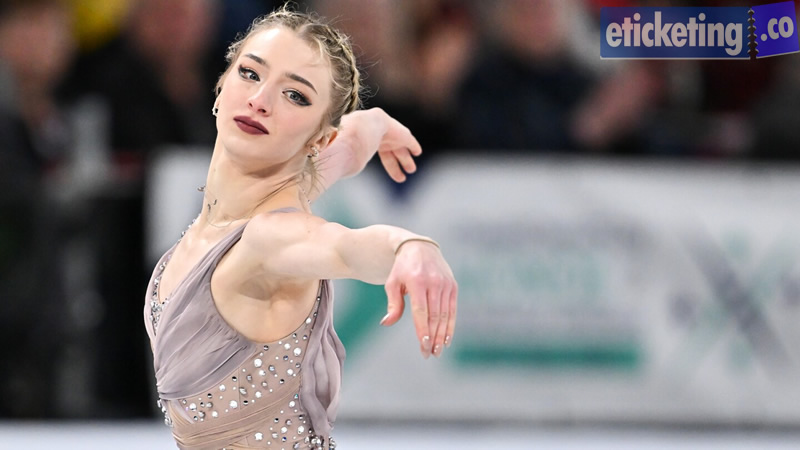
The Impact of Severe Concussions on Amber Glenn’s Career
Glenn’s journey to the top of the Winter Olympic figure skating world has been far from smooth, with her career marked by multiple severe concussions that have significantly affected her health and skating. Glenn has endured two major head injuries that resulted in the loss of her brain-body connection a condition that caused her to experience difficulties in her coordination and performance.
The first major concussion occurred in 2020, during a training session at the gym. She collided with another person, resulting in a black eye, a broken orbital bone, and a loss of consciousness. Glenn described the aftermath as bad, bad, bad stuff,” noting that the impact was so severe that it affected the opposite side of her skull from the 2024 incident. The second concussion occurred during a training session for choreography when she collided with another skater on the ice. This time, Glenn was knocked out cold, suffering from a black eye and a broken orbital bone. As a result, she was rushed to the hospital to receive treatment for her injuries.
Despite the severity of these injuries, Glenn believes that she may have experienced additional concussions earlier in her career as a young skater. However, these earlier incidents were likely undiagnosed and went largely ignored, with the injuries being dismissed as typical accidents that come with the sport. As a result, Glenn faced long-term repercussions from concussions that weren’t properly addressed at the time.
Winter Olympic 2026: The Impact on Performance
After these concussions, Glenn faced the challenge of competing while still struggling with symptoms of brain injury. Although she followed the necessary steps to recover and stay in peak physical condition, she quickly realized that her adrenaline levels and heightened stress would often trigger symptoms that interfered with her performance. I would do all the right things, train all the right stuff, but then it would all just go out the window, Glenn recalled. She found that the fight-or-flight response, triggered by her heightened adrenaline levels, would often hinder her ability to perform at her best, especially after the trauma of her concussions.
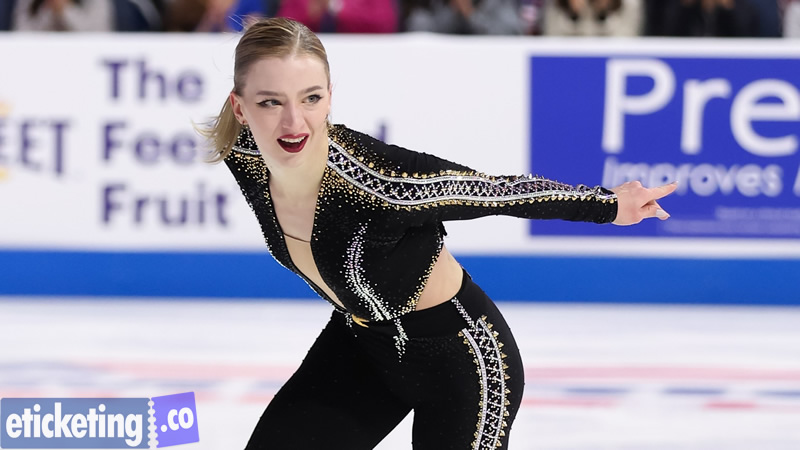
This led to Glenn seeking help from her sports psychologist, who recommended neurotherapy to assist in retraining her brain and calming her sympathetic nervous system. The therapy, which involved calming techniques based on scientific principles, was a game-changer for Glenn. It helped her find consistency in her performance and allowed her to regain control over her mind and body. You Can Read Winter Olympic 2026: Jason Brown Olympic Medalist Returns to Vail’s Ice Spectacular
Neurotherapy: A Crucial Step
The neurotherapy that Glenn pursued helped her manage the long-term effects of the concussions. This treatment, which trains the brain to calm down and shift into a more relaxed state, played a significant role in her ability to compete at a high level. There’s a lot of science in it, there’s a lot of just basically calming down, and not in a way that’s like, ‘Okay, tell yourself to calm down,’ it’s a literal scientific way to put yourself in that more relaxed state, she explained.
Glenn credits neurotherapy as absolutely crucial” to reaching the next level of her Winter Olympic figure skating career. She believes that she always had the capability to succeed but lacked the consistency in performance due to the lingering effects of her concussions. With the therapy, Glenn was able to build a stable foundation that helped her overcome the mental and physical barriers she had been facing.
Winter Olympic 2026: Resilience and Grand Prix Success
In December 2024, after years of setbacks, Glenn achieved her long-awaited dream of winning the ISU Grand Prix Final in Grenoble, France, becoming the first U.S. female figure skater to claim the prestigious title in 14 years. This victory was not only a testament to her skill and talent but also a demonstration of her perseverance in the face of adversity. Glenn’s ability to push through the challenges posed by her concussions and achieve the pinnacle of her sport shows the power of resilience and determination.
Despite her success, Glenn is quick to acknowledge the difficulties that come with being an older skater in a sport that often favors younger competitors. It’s a double-edged sword, Glenn said, recognizing that, while age brings wisdom, it also presents physical challenges in a sport that demands peak performance from an early age. However, she has learned to adapt and use her experiences to her advantage, pushing herself to compete at the highest level despite the challenges.
Amber Glenn’s Advocacy for Mental Health Awareness
Amber Glenn has become a vocal advocate for mental health awareness, using her personal journey to shed light on the importance of seeking support and talking openly about struggles. Through her own experiences with concussions and their aftermath, Glenn has learner how vital it is to recognize when help is need and to take the necessary steps to prioritize mental health.
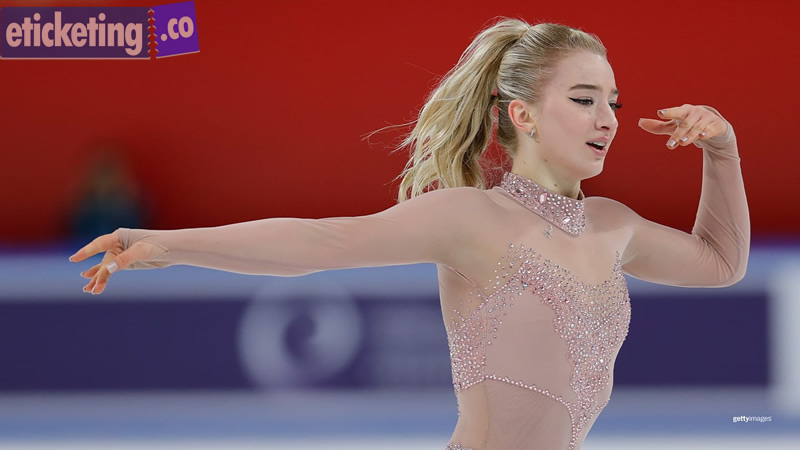
In her interviews, Glenn shares that one of the most important lessons she has learned is that people are more willing to help than you think. She encourages others facing their own struggles to reach out for support, whether from friends, family, or professional resources. In reality, people want to help, and they’re not going to be judgmental, she said, emphasizing the importance of seeking help before the emotional weight of a situation becomes too heavy to bear.
For Glenn, mental health is just as critical as physical health, and she advocates for people to recognize that their struggles—regardless of how severe they may seem—are valid. As she put it, You can drown in the ocean or you can drown in a kiddie pool or a puddle. It doesn’t matter how severe the cause or the reason is, you can still feel just as immense of emotions and things.
Winter Olympic Figure Skating: The U.S. National Championships
Amber Glenn’s journey is far from over. She is preparing to compete in the U.S. National Winter Olympic Figure Skating Championships in January 2025, which will be another opportunity for her to prove her resilience and determination on the ice. With her newfound mental and physical strength, Glenn will aim to continue her success, inspiring others with her story of overcoming adversity.
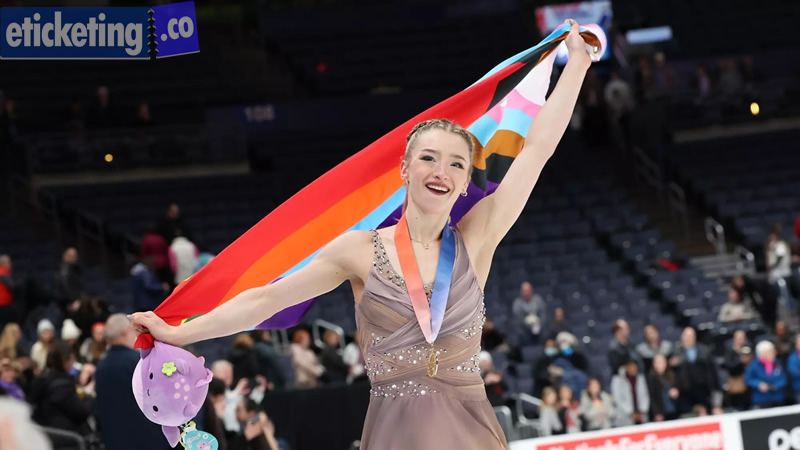
In the end, Glenn hopes her experiences can serve as an inspiration to those facing their own challenges, showing that even in the face of setbacks, success is possible. It has not been easy, but I’ve gotten through it, and I’ve shown that you can have these issues and still find success in what you love, she said. Her career is a powerful reminder that the road to success is often filled with obstacles, but it’s possible to overcome them with resilience, the right support, and a commitment to personal growth.
Olympic 2026 fans worldwide can book Olympic Figure Skating Tickets from our online platforms eticketing.co Fans can book Olympic Tickets on our website at discounted prices. Experience the thrill of the Games in Milano Cortina and support your favorite athletes as they compete for glory.
The Demands of Winter Olympic Figure Skating
Winter Olympic Figure skating is a physically and mentally demanding sport that requires athletes to perform intricate jumps, spins, and choreographed routines while maintaining grace and precision. Success in Winter Olympic figure skating depends on a combination of physical strength, flexibility, and mental fortitude. The sport is known for its rigorous training schedules and high level of competition, which often starts at a young age.
For athletes like Amber Glenn, the pressure to perform is immense, and injuries—particularly concussions—can significantly impact their careers. Concussions in Winter Olympic figure skating are not uncommon, especially considering the high-impact nature of jumps and falls on the ice. Athletes face the risk of both short-term and long-term effects, which can impact their ability to compete at the highest level.
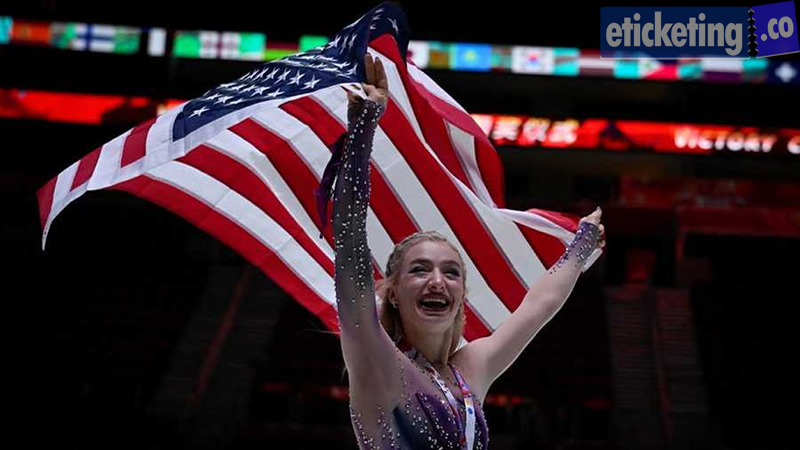
Resilience and Perseverance in Winter Olympic Figure Skating
Glenn’s perseverance through these challenges highlights the strength required to succeed in Winter Olympic figure skating. Her commitment to overcoming the physical and mental barriers set by concussions is a testament to the resilience that is necessary in the sport. As the Winter Olympic figure skating community continues to push the limits of performance, the mental and physical well-being of athletes like Amber Glenn will continue to be a critical focus.
Experience the magic and excitement as fans from around the world gather to celebrate the spirit of the Games. Secure your Olympic Opening Ceremony Tickets now and create memories that will last a lifetime at the unforgettable Winter Olympic 2026.
